外研版(2019)必修第二册Unit 1 Food for thought Understanding ideas 课件(共37张PPT)
文档属性
| 名称 | 外研版(2019)必修第二册Unit 1 Food for thought Understanding ideas 课件(共37张PPT) |
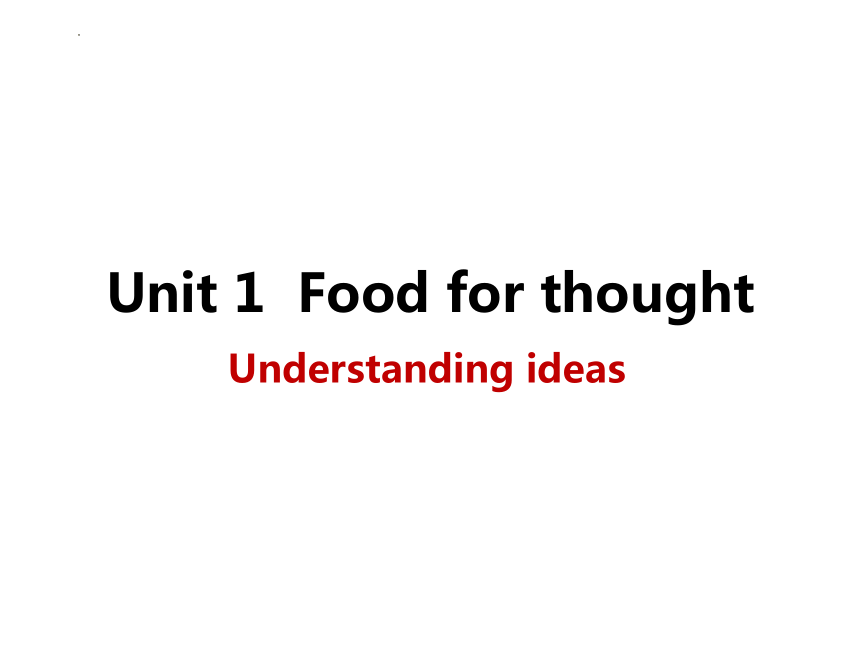
|
|
| 格式 | pptx | ||
| 文件大小 | 4.5MB | ||
| 资源类型 | 教案 | ||
| 版本资源 | 外研版(2019) | ||
| 科目 | 英语 | ||
| 更新时间 | 2023-07-21 00:00:00 | ||
图片预览

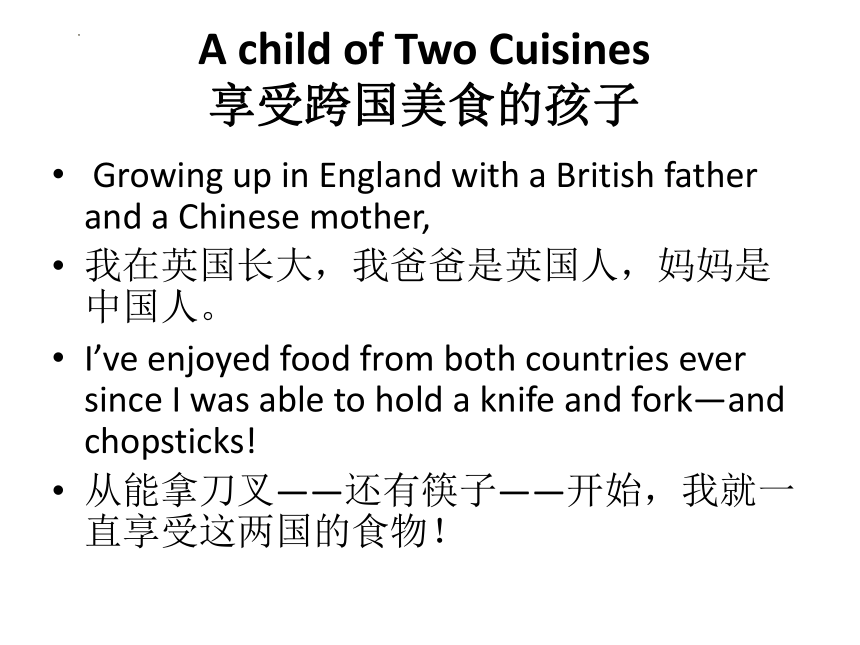
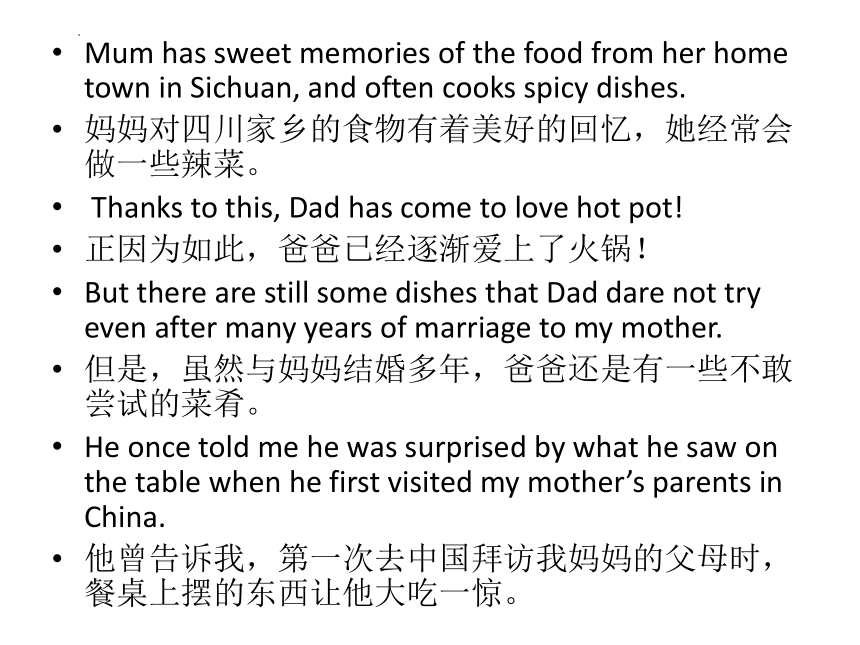

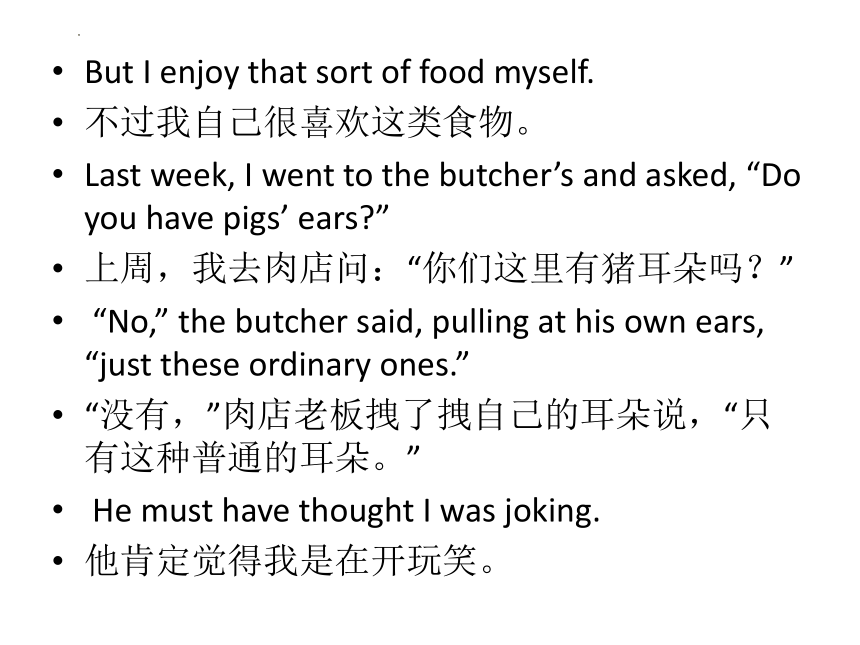
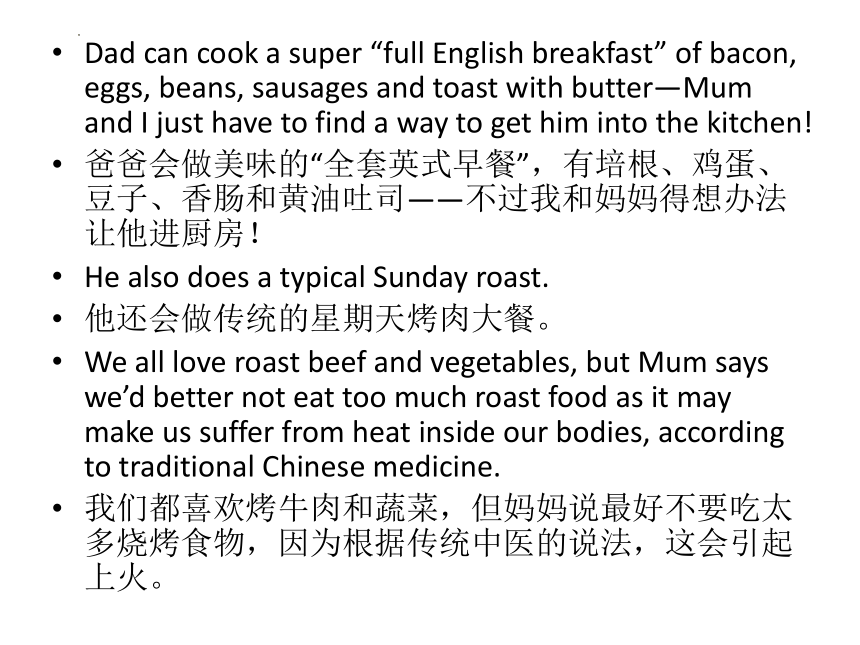


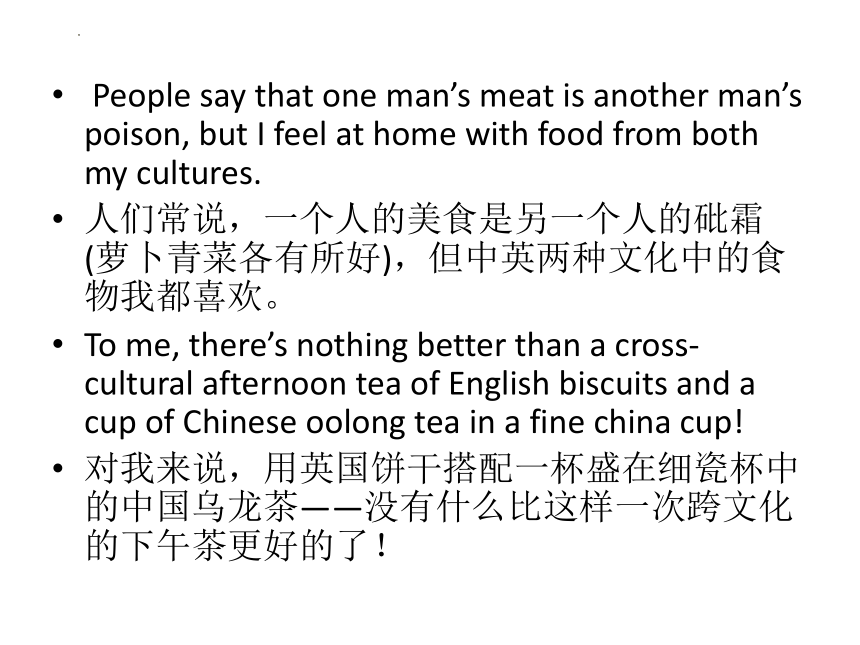

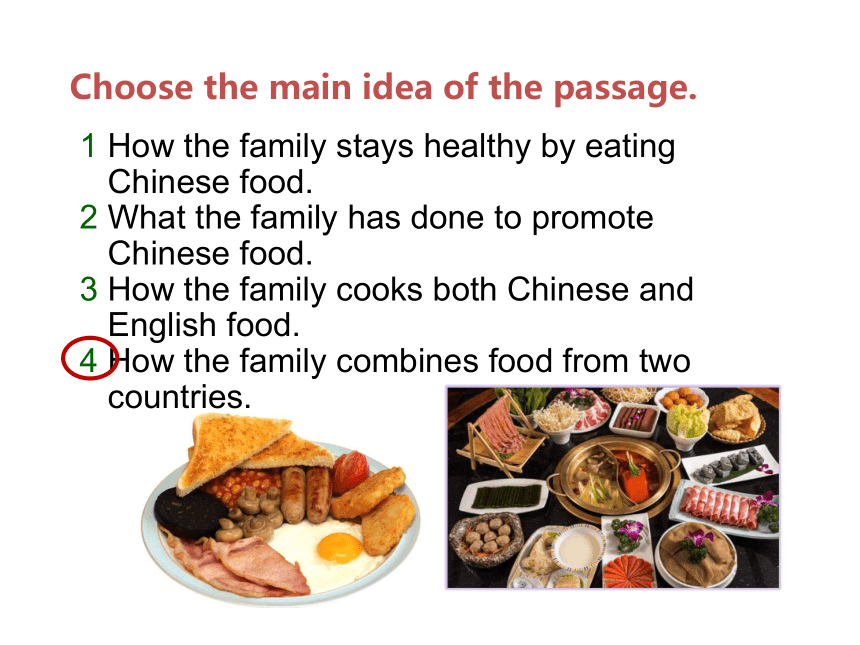
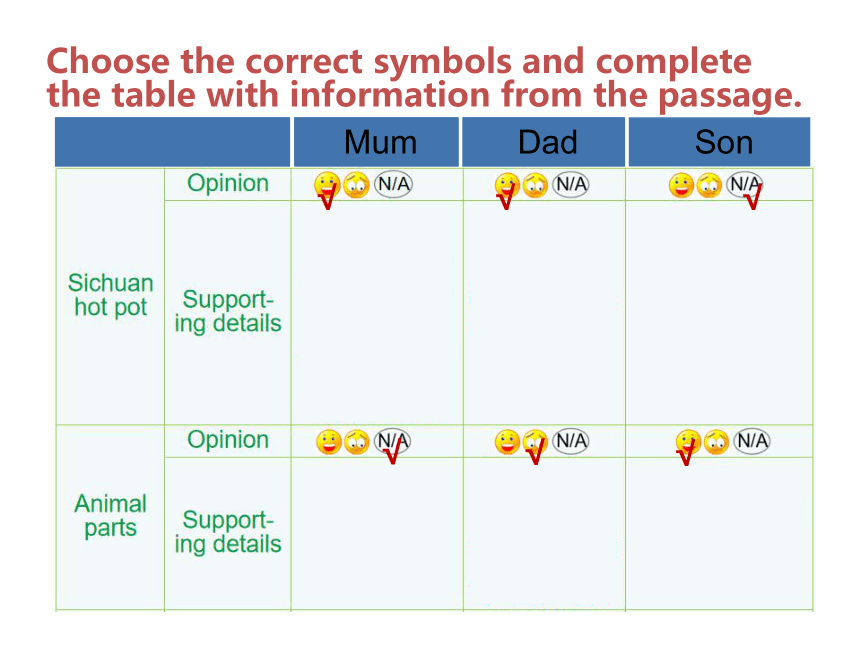
文档简介
(共37张PPT)
Understanding ideas
Unit 1 Food for thought
A child of Two Cuisines
享受跨国美食的孩子
Growing up in England with a British father and a Chinese mother,
我在英国长大,我爸爸是英国人,妈妈是中国人。
I’ve enjoyed food from both countries ever since I was able to hold a knife and fork—and chopsticks!
从能拿刀叉——还有筷子——开始,我就一直享受这两国的食物!
Mum has sweet memories of the food from her home town in Sichuan, and often cooks spicy dishes.
妈妈对四川家乡的食物有着美好的回忆,她经常会做一些辣菜。
Thanks to this, Dad has come to love hot pot!
正因为如此,爸爸已经逐渐爱上了火锅!
But there are still some dishes that Dad dare not try even after many years of marriage to my mother.
但是,虽然与妈妈结婚多年,爸爸还是有一些不敢尝试的菜肴。
He once told me he was surprised by what he saw on the table when he first visited my mother’s parents in China.
他曾告诉我,第一次去中国拜访我妈妈的父母时,餐桌上摆的东西让他大吃一惊。
He was even shocked at their wedding when he saw how the Chinese ate almost every part of an animal.
在婚礼上,他更是吓了一跳,因为他差不多动物的所有部位中国人都吃。
Even today, he still does not easily take to eating things like chicken feet.
直到今天,他还是不习惯吃鸡爪之类的东西。
But I enjoy that sort of food myself.
不过我自己很喜欢这类食物。
Last week, I went to the butcher’s and asked, “Do you have pigs’ ears ”
上周,我去肉店问:“你们这里有猪耳朵吗?”
“No,” the butcher said, pulling at his own ears, “just these ordinary ones.”
“没有,”肉店老板拽了拽自己的耳朵说,“只有这种普通的耳朵。”
He must have thought I was joking.
他肯定觉得我是在开玩笑。
Dad can cook a super “full English breakfast” of bacon, eggs, beans, sausages and toast with butter—Mum and I just have to find a way to get him into the kitchen!
爸爸会做美味的“全套英式早餐”,有培根、鸡蛋、豆子、香肠和黄油吐司——不过我和妈妈得想办法让他进厨房!
He also does a typical Sunday roast.
他还会做传统的星期天烤肉大餐。
We all love roast beef and vegetables, but Mum says we’d better not eat too much roast food as it may make us suffer from heat inside our bodies, according to traditional Chinese medicine.
我们都喜欢烤牛肉和蔬菜,但妈妈说最好不要吃太多烧烤食物,因为根据传统中医的说法,这会引起上火。
I’ll never forget my first visit to China.
我永远不会忘记自己的第一次中国之旅。
Mum encouraged me to try different kinds of food, and I did! I loved everything.
妈妈鼓励我尝试各种食物,我照做了!我什么都喜欢吃。
But just when I thought I could deal with all Chinese food, I came across stinky tofu, a horrible grey thing that looked and smelt like a burnt sports shoe.
可是就在我以为自己能够接受所有的中国食物时,我遇到了臭豆腐,一种可怕的灰色食物,样子和味道就像是烧焦的运动鞋。
“You needn’t try it if you don’t want to,”Mum said, but I gathered all my courage to take a bite and was amazed to find it wasn’t so bad.
“如果你不想尝试的话,可以不吃,”妈妈说。但我还是鼓起勇气咬了一口,结果惊奇地发现味道还不错。
It reminded me of blue cheese, a similarly strong smelling type of food you either love or hate.
它的味道让我想起了蓝纹奶酪,一种类似的有着浓重气味的食物,你要么你爱上它,要么会恨死它。
Maybe I’ll fall in love with stinky tofu—someday.
也许我会爱上臭豆腐的——将来总有那么一天吧。
People say that one man’s meat is another man’s poison, but I feel at home with food from both my cultures.
人们常说,一个人的美食是另一个人的砒霜(萝卜青菜各有所好),但中英两种文化中的食物我都喜欢。
To me, there’s nothing better than a cross-cultural afternoon tea of English biscuits and a cup of Chinese oolong tea in a fine china cup!
对我来说,用英国饼干搭配一杯盛在细瓷杯中的中国乌龙茶——没有什么比这样一次跨文化的下午茶更好的了!
While-reading
Read the passage and talk about your
understanding of the title.
My father is British and my mother is Chinese. Thanks to that, I've been able enjoy food from both countries ever since I was a child.
Choose the main idea of the passage.
1 How the family stays healthy by eating
Chinese food.
2 What the family has done to promote
Chinese food.
3 How the family cooks both Chinese and
English food.
4 How the family combines food from two
countries.
Choose the correct symbols and complete the table with information from the passage.
Mum
Dad
Son
Mum
Dad
√
√
√
√
√
√
Son
Mum
Dad
√
√
√
√
√
√
√
√
√
Retell the text according to the diagram.
Sichuan hot pot
Animal parts
Full English breakfast
Sunday roast
Stinky tofu
One man's meat is another man's poison.
not take to
enjoy
all love
horrible
come
to love
sweet memory
find a way
After-reading
Think and share:
1. What does the author mean by saying
“one man's meat is another man's poison”
Do you know of any similar sayings in
Chinese
It means that one person likes may not be liked by someone else.
Similar sayings in Chinese include“萝卜青菜,各有所爱”, etc.
2 What food from other regions in China
or other countries has made an
impression on you Why
Sichuan cuisine. It is known for its spicy. It strikes me with double flavours.
...
例:你敢告诉他事实吗?
Dare you tell him the truth
Do you dare (to) tell him the truth
But there are still some dishes that Dad dare not try even after many years of marriage to my mother.
1
句意:但仍然有一些菜是爸爸甚至是和妈妈结婚多年以后也不敢尝试的。
1. dare:在此句中是一个情态动词,没有人称和数的变化,主要用于否定句和疑问句,dare not表示“不敢”;dare作实义动词,意为“敢,敢于”,在人称、数和时态上与其他实义动词相同。
She has two children by a previous marriage.
My parents are celebrating 30 years of marriage.
But there are still some dishes that Dad dare not try even after many years of marriage to my mother.
1
句意:但仍然有一些菜是爸爸甚至是和妈妈结婚多年以后也不敢尝试的。
2. marriage:
[C] the legal relationship between a husband and wife 婚姻关系
[U]the state of being married结婚
marry v.与……结婚
[C]
[U]
take to doing sth.: to start doing sth. regularly or as a habit.开始习惯做某事
take to sb./ sth.: to start to like sb. or sth.开始喜欢上某人或某物
Even today, he still does not easily take to eating things like chicken feet.
2
句意:即使在今天,他仍然不习惯吃鸡爪之类的东西。
①汤姆习惯于每天早上慢跑锻炼。
Tom has taken to _____ jogging every morning.
②她喜欢上了篮球而且如鱼得水。
She's ______ basketball like a duck to water.
going
taken to
【一题一练】
Paraphrase: I'm sure that he thought I was joking. 他一定以为我在开玩笑。
must have done表示对过去发生的动作或状态的肯定推测,意为“一定,准是……”;而对现在或将来发生的动作或状态的肯定推测要用must do。
①走了这么久,你一定饿了。
You ________ hungry after a long walk.
②既然路是湿的,昨晚一定下雨了。
Since the road is wet, it _______________
last night.
He must have thought I was joking.
3
must be
must have rained
【一题一练】
What is a full English breakfast
A full English breakfast is a breakfast meal that typically includes bacon, sausages, eggs, other cooked foods and a beverage such as a coffee or tea.
Dad can cook a super“full English breakfast”of bacon, eggs, beans, sausages and toast with butter ...
4
typical:having the usual qualities or features of a particular type of person, thing or group
adj. 典型的
adv. typically
①这顿饭是典型的地方烹调。
This meal is ______ of local cookery.
②主菜是典型的瑞士菜。
The main course was _______ Swiss.
He also does a typical Sunday roast.
5
句意:他也会做典型的周日烤肉。
【一题一练】
typical
typically
suffer from: 患(病);因…受困扰
①他经常胃痛。
He always __________ stomach trouble.
②他为贫困所扰。
She __________ poverty.
... but Mum says we'd better not eat too much roast food as it may make us suffer from heat inside our bodies, according to traditional Chinese medicine.
6
句意:但是妈妈说我们最好不要吃太多烤制的食物,因为根据中医的说法,烤制的食物可能会使我们的身体内部受热。
【一题一练】
suffers from
suffers from
1. come across 偶然发现或碰到;穿过(路、桥等);起到预期的效果、效果好。
①车子多的时候不要过街。
Don't ___________ the street when there is
heavy traffic.
②我昨天找书的时候,偶然发现了这张早年的照片。
I __________ this old photograph when looking
for a book yesterday.
I came across stinky tofu, a horrible grey thing that looked and smelt like a burnt sports shoe.
7
句意:我偶然发现臭豆腐,一种可怕的灰色东西,看起来和闻起来像一只烧焦的运动鞋。
【一题一练】
come across
came across
2. horrible: (especially spoken) very bad or unpleasant; used to describe sth that you do not like。糟糕的,可憎的,令人厌恶的
a horrible weather 糟糕的天气
a horrible monster 可怕的怪物
a horrible man 不友好的人
I came across stinky tofu, a horrible grey thing that looked and smelt like a burnt sports shoe.
7
句意:我偶然发现臭豆腐,一种可怕的灰色东西,看起来和闻起来像一只烧焦的运动鞋。
【一题一练】
我有种可怕的感觉——她对我撒了谎。
I've got a ________ feeling she lied to us.
horrible
feel at home: 感觉自在;感到很舒畅
①我们假期里在海滨玩得很痛快,每个人都感到
舒畅。
We had a good time by the sea during the
holidays.Everybody ______________ there.
②如果在船上,你感到舒服吗?
Do you __________ if you are on board a ship?
People say that one man's meat is another man's poison, but I feel at home with food from both my cultures.
8
句意:人们常说,一个人的美食是另一个人的毒药,但我对来自两种文化背景的食物都很熟悉。
【一题一练】
felt quite at home
feel at home
there's nothing better than...没有什么比……更好的了。
在那一刻,没有什么能比她的微笑更美好的了。
At that moment, _____________________ her smile.
To me, there's nothing better than a cross - cultural afternoon tea of English biscuits and a cup of Chinese oolong tea in a fine china cup!
9
there's nothing better than
【一题一练】
句意:对我来说,没有什么比一杯英国饼干的跨文化下午茶和一杯中国乌龙茶更好的了。
It’s extremely easy to distinguish the Western and Oriental food culture if you have watched some movies that refer to something about food culture.
如果你看过有涉及到饮食文化的电影,就很容易区别它们的差异。
To be specific, there are five main differences, and here Oriental food culture takes China as an example.
具体说,主要有5个方面的差异。这里东方饮食文化就以中国作为代表。
Now let's go and see some details on these differences.
下面咱们一起来了解一下这些细节。
the concept 观念
Western people pay much attention to nutrition intake, while Chinese people prefer deliciousness.
西方人注重营养摄入,而中国人偏爱美味。
1. condiment
英 [ k nd m nt]
美 [ kɑ nd m nt]
n. 调味料;作料;调味汁(或酱等);酱料
2. aesthetic
英 [i s θet k] 美 [es θet k]
adj. 审美的;有审美观点的;美学的;美的;艺术的
n. 美感;审美观;美学
In Western opinions, they care so much on the details that Western people calculate how much amount of heat should be eaten in a meal. Also their nutrition is bound to be guaranteed, including protein, fibre, calorie and so forth, no matter how food smells or tastes. In Chinese people’s eyes, they pursue deliciousness. The taste of food itself after being heated, plus the fragrance of condiment, make the cuisine more tasty and delicious, and that is the most important performance of the Chinese aesthetic diet concept.
在西方人看来,他们太在意细节,以至于要计算每餐要摄入多少的热量。不管食物的香味怎样,他们的营养也需要得到保证,包括蛋白质、纤维、卡路里等在内。在中国人眼中,他们追求美味。加热后的食物味道,以及调配料的香味,使得菜肴更加可口。这就是中国美性饮食观念的最重要表现。
Western breakfast is mostly the same as the picture above, and nutrition is fixed
西式早餐大多与图片的一样,并且营养是固定的
Chinese breakfast is outstanding in taste, with a certain aesthetic value, like wonton
中式早餐则味道突出,具有一定的审美价值,如馄饨
the purpose 目的
Western people like making friendship with neighboring guests during a meal, while Chinese think highly of atmosphere and pleasure.
西方人喜爱与邻座客人交谊,而中国人高度重视气氛和愉悦。
This has something to do with different kinds of table. In China, people have a feast by using round table, which, in a way shapes an atmosphere full of unity, politeness and respectfulness. While in Western countries, a rectangular table is needed so that it‘s convenient to make friendship by having a talk with neighboring guests during feast time.
这就与使用的桌子种类有关系。在中国,人们享用喜宴时通常用到圆桌,这样在一定程度上塑造了一种团结、礼貌、相互尊重的气氛。而在西方国家,人们则使用长桌共享喜宴,这样有便于与邻座客人通过交谈的方式交谊。
Western people sit beside the rectangular table while feasting
西方人坐在长桌边饮食
Eastern people circle the table while feasting(cartoon)
东方人围圆桌饮食(漫画)
the habit 习惯
Western people get accustomed to using knives and forks, while Chinese people use chopsticks.
西方人习惯用刀叉,而中国人则使用筷子。
The usage of knives and forks in Western countries dates back to the Byzantine Empire, a thousand years later than the Warring States period in China. While in China, they think it easy and convenient to use chopsticks, which dates back to a legend happened in Shang Dynasty. In 1970s, archeologists had discovered that there was a pair of bamboo chopsticks on the lacquer table besides wine cups and lunch boxes, which meant that chopsticks had been used in the Han Dynasty.
西方国家刀叉的使用可追溯到拜占庭帝国时期,比战国时期要晚一千年。而在中国,他们认为使用筷子很容易且方便。中国人使用筷子起源于发生在商代的一个传说。在上个世纪70年代,考古人员发现,漆案上面还除了酒杯、餐盒外,还有一双竹筷子,这意味着在汉朝时人们就已经使用筷子了。
common placement of knives and forks in Western countries
西方人常见的刀叉摆法
Chinese culture of chopsticks
中国人的筷子文化
environment requirement 环境要求
Western people like eating in exquisite environment, while Chinese people like having meal together.
西方人喜欢在精致的环境下就餐,而中国人则喜欢聚餐。
In Western country, especially in France, Italy and English, you can see that the restaurants are exquisite and elegant, which make people comfortable and pleasant. While in China, especially in the countryside, you can see that people have a feast in their yards or other spacious place, showing their casualness towards environment requirement when feasting.
在西方国家,尤其是法国、意大利和英国,你可以看到这些国家的餐厅很精致优雅,让人们感到舒适欢快。而在中国,尤其是农村地区,你可以看到人们在自家的院子里共享宴席,展现了他们对用餐环境要求的随意性。
the preference 偏好
Western people like eating desserts, while Chinese people like salty food.
西方人偏爱吃甜食,而中国人喜欢吃咸食。
In Western country, there exists afternoon-tea culture. In the afternoon, people usually have some tea and desserts as afternoon tea in order to be more energetic to finish the rest of work, and this habit has been formed. While in China, absolutely the salt must be used when cooking, which can make the cuisine taste better.
西方国家有他们的下午茶文化。人们通常品茶水、吃蛋糕,就作为他们的下午茶,目的就是保持精力完成剩余工作,这就形成了一种习惯。而在中国,所有人在做菜的时候当然必须要放盐,这能让菜肴味道更好。
Understanding ideas
Unit 1 Food for thought
A child of Two Cuisines
享受跨国美食的孩子
Growing up in England with a British father and a Chinese mother,
我在英国长大,我爸爸是英国人,妈妈是中国人。
I’ve enjoyed food from both countries ever since I was able to hold a knife and fork—and chopsticks!
从能拿刀叉——还有筷子——开始,我就一直享受这两国的食物!
Mum has sweet memories of the food from her home town in Sichuan, and often cooks spicy dishes.
妈妈对四川家乡的食物有着美好的回忆,她经常会做一些辣菜。
Thanks to this, Dad has come to love hot pot!
正因为如此,爸爸已经逐渐爱上了火锅!
But there are still some dishes that Dad dare not try even after many years of marriage to my mother.
但是,虽然与妈妈结婚多年,爸爸还是有一些不敢尝试的菜肴。
He once told me he was surprised by what he saw on the table when he first visited my mother’s parents in China.
他曾告诉我,第一次去中国拜访我妈妈的父母时,餐桌上摆的东西让他大吃一惊。
He was even shocked at their wedding when he saw how the Chinese ate almost every part of an animal.
在婚礼上,他更是吓了一跳,因为他差不多动物的所有部位中国人都吃。
Even today, he still does not easily take to eating things like chicken feet.
直到今天,他还是不习惯吃鸡爪之类的东西。
But I enjoy that sort of food myself.
不过我自己很喜欢这类食物。
Last week, I went to the butcher’s and asked, “Do you have pigs’ ears ”
上周,我去肉店问:“你们这里有猪耳朵吗?”
“No,” the butcher said, pulling at his own ears, “just these ordinary ones.”
“没有,”肉店老板拽了拽自己的耳朵说,“只有这种普通的耳朵。”
He must have thought I was joking.
他肯定觉得我是在开玩笑。
Dad can cook a super “full English breakfast” of bacon, eggs, beans, sausages and toast with butter—Mum and I just have to find a way to get him into the kitchen!
爸爸会做美味的“全套英式早餐”,有培根、鸡蛋、豆子、香肠和黄油吐司——不过我和妈妈得想办法让他进厨房!
He also does a typical Sunday roast.
他还会做传统的星期天烤肉大餐。
We all love roast beef and vegetables, but Mum says we’d better not eat too much roast food as it may make us suffer from heat inside our bodies, according to traditional Chinese medicine.
我们都喜欢烤牛肉和蔬菜,但妈妈说最好不要吃太多烧烤食物,因为根据传统中医的说法,这会引起上火。
I’ll never forget my first visit to China.
我永远不会忘记自己的第一次中国之旅。
Mum encouraged me to try different kinds of food, and I did! I loved everything.
妈妈鼓励我尝试各种食物,我照做了!我什么都喜欢吃。
But just when I thought I could deal with all Chinese food, I came across stinky tofu, a horrible grey thing that looked and smelt like a burnt sports shoe.
可是就在我以为自己能够接受所有的中国食物时,我遇到了臭豆腐,一种可怕的灰色食物,样子和味道就像是烧焦的运动鞋。
“You needn’t try it if you don’t want to,”Mum said, but I gathered all my courage to take a bite and was amazed to find it wasn’t so bad.
“如果你不想尝试的话,可以不吃,”妈妈说。但我还是鼓起勇气咬了一口,结果惊奇地发现味道还不错。
It reminded me of blue cheese, a similarly strong smelling type of food you either love or hate.
它的味道让我想起了蓝纹奶酪,一种类似的有着浓重气味的食物,你要么你爱上它,要么会恨死它。
Maybe I’ll fall in love with stinky tofu—someday.
也许我会爱上臭豆腐的——将来总有那么一天吧。
People say that one man’s meat is another man’s poison, but I feel at home with food from both my cultures.
人们常说,一个人的美食是另一个人的砒霜(萝卜青菜各有所好),但中英两种文化中的食物我都喜欢。
To me, there’s nothing better than a cross-cultural afternoon tea of English biscuits and a cup of Chinese oolong tea in a fine china cup!
对我来说,用英国饼干搭配一杯盛在细瓷杯中的中国乌龙茶——没有什么比这样一次跨文化的下午茶更好的了!
While-reading
Read the passage and talk about your
understanding of the title.
My father is British and my mother is Chinese. Thanks to that, I've been able enjoy food from both countries ever since I was a child.
Choose the main idea of the passage.
1 How the family stays healthy by eating
Chinese food.
2 What the family has done to promote
Chinese food.
3 How the family cooks both Chinese and
English food.
4 How the family combines food from two
countries.
Choose the correct symbols and complete the table with information from the passage.
Mum
Dad
Son
Mum
Dad
√
√
√
√
√
√
Son
Mum
Dad
√
√
√
√
√
√
√
√
√
Retell the text according to the diagram.
Sichuan hot pot
Animal parts
Full English breakfast
Sunday roast
Stinky tofu
One man's meat is another man's poison.
not take to
enjoy
all love
horrible
come
to love
sweet memory
find a way
After-reading
Think and share:
1. What does the author mean by saying
“one man's meat is another man's poison”
Do you know of any similar sayings in
Chinese
It means that one person likes may not be liked by someone else.
Similar sayings in Chinese include“萝卜青菜,各有所爱”, etc.
2 What food from other regions in China
or other countries has made an
impression on you Why
Sichuan cuisine. It is known for its spicy. It strikes me with double flavours.
...
例:你敢告诉他事实吗?
Dare you tell him the truth
Do you dare (to) tell him the truth
But there are still some dishes that Dad dare not try even after many years of marriage to my mother.
1
句意:但仍然有一些菜是爸爸甚至是和妈妈结婚多年以后也不敢尝试的。
1. dare:在此句中是一个情态动词,没有人称和数的变化,主要用于否定句和疑问句,dare not表示“不敢”;dare作实义动词,意为“敢,敢于”,在人称、数和时态上与其他实义动词相同。
She has two children by a previous marriage.
My parents are celebrating 30 years of marriage.
But there are still some dishes that Dad dare not try even after many years of marriage to my mother.
1
句意:但仍然有一些菜是爸爸甚至是和妈妈结婚多年以后也不敢尝试的。
2. marriage:
[C] the legal relationship between a husband and wife 婚姻关系
[U]the state of being married结婚
marry v.与……结婚
[C]
[U]
take to doing sth.: to start doing sth. regularly or as a habit.开始习惯做某事
take to sb./ sth.: to start to like sb. or sth.开始喜欢上某人或某物
Even today, he still does not easily take to eating things like chicken feet.
2
句意:即使在今天,他仍然不习惯吃鸡爪之类的东西。
①汤姆习惯于每天早上慢跑锻炼。
Tom has taken to _____ jogging every morning.
②她喜欢上了篮球而且如鱼得水。
She's ______ basketball like a duck to water.
going
taken to
【一题一练】
Paraphrase: I'm sure that he thought I was joking. 他一定以为我在开玩笑。
must have done表示对过去发生的动作或状态的肯定推测,意为“一定,准是……”;而对现在或将来发生的动作或状态的肯定推测要用must do。
①走了这么久,你一定饿了。
You ________ hungry after a long walk.
②既然路是湿的,昨晚一定下雨了。
Since the road is wet, it _______________
last night.
He must have thought I was joking.
3
must be
must have rained
【一题一练】
What is a full English breakfast
A full English breakfast is a breakfast meal that typically includes bacon, sausages, eggs, other cooked foods and a beverage such as a coffee or tea.
Dad can cook a super“full English breakfast”of bacon, eggs, beans, sausages and toast with butter ...
4
typical:having the usual qualities or features of a particular type of person, thing or group
adj. 典型的
adv. typically
①这顿饭是典型的地方烹调。
This meal is ______ of local cookery.
②主菜是典型的瑞士菜。
The main course was _______ Swiss.
He also does a typical Sunday roast.
5
句意:他也会做典型的周日烤肉。
【一题一练】
typical
typically
suffer from: 患(病);因…受困扰
①他经常胃痛。
He always __________ stomach trouble.
②他为贫困所扰。
She __________ poverty.
... but Mum says we'd better not eat too much roast food as it may make us suffer from heat inside our bodies, according to traditional Chinese medicine.
6
句意:但是妈妈说我们最好不要吃太多烤制的食物,因为根据中医的说法,烤制的食物可能会使我们的身体内部受热。
【一题一练】
suffers from
suffers from
1. come across 偶然发现或碰到;穿过(路、桥等);起到预期的效果、效果好。
①车子多的时候不要过街。
Don't ___________ the street when there is
heavy traffic.
②我昨天找书的时候,偶然发现了这张早年的照片。
I __________ this old photograph when looking
for a book yesterday.
I came across stinky tofu, a horrible grey thing that looked and smelt like a burnt sports shoe.
7
句意:我偶然发现臭豆腐,一种可怕的灰色东西,看起来和闻起来像一只烧焦的运动鞋。
【一题一练】
come across
came across
2. horrible: (especially spoken) very bad or unpleasant; used to describe sth that you do not like。糟糕的,可憎的,令人厌恶的
a horrible weather 糟糕的天气
a horrible monster 可怕的怪物
a horrible man 不友好的人
I came across stinky tofu, a horrible grey thing that looked and smelt like a burnt sports shoe.
7
句意:我偶然发现臭豆腐,一种可怕的灰色东西,看起来和闻起来像一只烧焦的运动鞋。
【一题一练】
我有种可怕的感觉——她对我撒了谎。
I've got a ________ feeling she lied to us.
horrible
feel at home: 感觉自在;感到很舒畅
①我们假期里在海滨玩得很痛快,每个人都感到
舒畅。
We had a good time by the sea during the
holidays.Everybody ______________ there.
②如果在船上,你感到舒服吗?
Do you __________ if you are on board a ship?
People say that one man's meat is another man's poison, but I feel at home with food from both my cultures.
8
句意:人们常说,一个人的美食是另一个人的毒药,但我对来自两种文化背景的食物都很熟悉。
【一题一练】
felt quite at home
feel at home
there's nothing better than...没有什么比……更好的了。
在那一刻,没有什么能比她的微笑更美好的了。
At that moment, _____________________ her smile.
To me, there's nothing better than a cross - cultural afternoon tea of English biscuits and a cup of Chinese oolong tea in a fine china cup!
9
there's nothing better than
【一题一练】
句意:对我来说,没有什么比一杯英国饼干的跨文化下午茶和一杯中国乌龙茶更好的了。
It’s extremely easy to distinguish the Western and Oriental food culture if you have watched some movies that refer to something about food culture.
如果你看过有涉及到饮食文化的电影,就很容易区别它们的差异。
To be specific, there are five main differences, and here Oriental food culture takes China as an example.
具体说,主要有5个方面的差异。这里东方饮食文化就以中国作为代表。
Now let's go and see some details on these differences.
下面咱们一起来了解一下这些细节。
the concept 观念
Western people pay much attention to nutrition intake, while Chinese people prefer deliciousness.
西方人注重营养摄入,而中国人偏爱美味。
1. condiment
英 [ k nd m nt]
美 [ kɑ nd m nt]
n. 调味料;作料;调味汁(或酱等);酱料
2. aesthetic
英 [i s θet k] 美 [es θet k]
adj. 审美的;有审美观点的;美学的;美的;艺术的
n. 美感;审美观;美学
In Western opinions, they care so much on the details that Western people calculate how much amount of heat should be eaten in a meal. Also their nutrition is bound to be guaranteed, including protein, fibre, calorie and so forth, no matter how food smells or tastes. In Chinese people’s eyes, they pursue deliciousness. The taste of food itself after being heated, plus the fragrance of condiment, make the cuisine more tasty and delicious, and that is the most important performance of the Chinese aesthetic diet concept.
在西方人看来,他们太在意细节,以至于要计算每餐要摄入多少的热量。不管食物的香味怎样,他们的营养也需要得到保证,包括蛋白质、纤维、卡路里等在内。在中国人眼中,他们追求美味。加热后的食物味道,以及调配料的香味,使得菜肴更加可口。这就是中国美性饮食观念的最重要表现。
Western breakfast is mostly the same as the picture above, and nutrition is fixed
西式早餐大多与图片的一样,并且营养是固定的
Chinese breakfast is outstanding in taste, with a certain aesthetic value, like wonton
中式早餐则味道突出,具有一定的审美价值,如馄饨
the purpose 目的
Western people like making friendship with neighboring guests during a meal, while Chinese think highly of atmosphere and pleasure.
西方人喜爱与邻座客人交谊,而中国人高度重视气氛和愉悦。
This has something to do with different kinds of table. In China, people have a feast by using round table, which, in a way shapes an atmosphere full of unity, politeness and respectfulness. While in Western countries, a rectangular table is needed so that it‘s convenient to make friendship by having a talk with neighboring guests during feast time.
这就与使用的桌子种类有关系。在中国,人们享用喜宴时通常用到圆桌,这样在一定程度上塑造了一种团结、礼貌、相互尊重的气氛。而在西方国家,人们则使用长桌共享喜宴,这样有便于与邻座客人通过交谈的方式交谊。
Western people sit beside the rectangular table while feasting
西方人坐在长桌边饮食
Eastern people circle the table while feasting(cartoon)
东方人围圆桌饮食(漫画)
the habit 习惯
Western people get accustomed to using knives and forks, while Chinese people use chopsticks.
西方人习惯用刀叉,而中国人则使用筷子。
The usage of knives and forks in Western countries dates back to the Byzantine Empire, a thousand years later than the Warring States period in China. While in China, they think it easy and convenient to use chopsticks, which dates back to a legend happened in Shang Dynasty. In 1970s, archeologists had discovered that there was a pair of bamboo chopsticks on the lacquer table besides wine cups and lunch boxes, which meant that chopsticks had been used in the Han Dynasty.
西方国家刀叉的使用可追溯到拜占庭帝国时期,比战国时期要晚一千年。而在中国,他们认为使用筷子很容易且方便。中国人使用筷子起源于发生在商代的一个传说。在上个世纪70年代,考古人员发现,漆案上面还除了酒杯、餐盒外,还有一双竹筷子,这意味着在汉朝时人们就已经使用筷子了。
common placement of knives and forks in Western countries
西方人常见的刀叉摆法
Chinese culture of chopsticks
中国人的筷子文化
environment requirement 环境要求
Western people like eating in exquisite environment, while Chinese people like having meal together.
西方人喜欢在精致的环境下就餐,而中国人则喜欢聚餐。
In Western country, especially in France, Italy and English, you can see that the restaurants are exquisite and elegant, which make people comfortable and pleasant. While in China, especially in the countryside, you can see that people have a feast in their yards or other spacious place, showing their casualness towards environment requirement when feasting.
在西方国家,尤其是法国、意大利和英国,你可以看到这些国家的餐厅很精致优雅,让人们感到舒适欢快。而在中国,尤其是农村地区,你可以看到人们在自家的院子里共享宴席,展现了他们对用餐环境要求的随意性。
the preference 偏好
Western people like eating desserts, while Chinese people like salty food.
西方人偏爱吃甜食,而中国人喜欢吃咸食。
In Western country, there exists afternoon-tea culture. In the afternoon, people usually have some tea and desserts as afternoon tea in order to be more energetic to finish the rest of work, and this habit has been formed. While in China, absolutely the salt must be used when cooking, which can make the cuisine taste better.
西方国家有他们的下午茶文化。人们通常品茶水、吃蛋糕,就作为他们的下午茶,目的就是保持精力完成剩余工作,这就形成了一种习惯。而在中国,所有人在做菜的时候当然必须要放盐,这能让菜肴味道更好。
